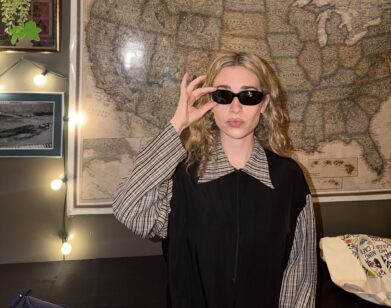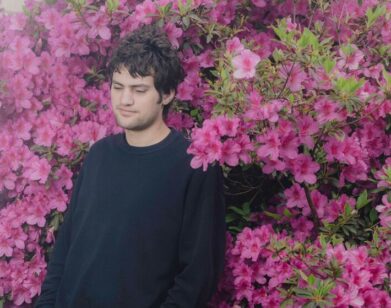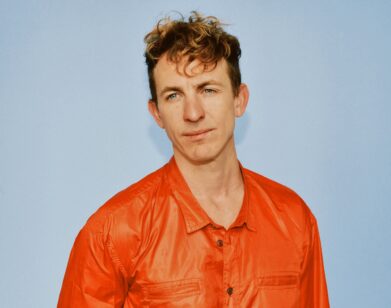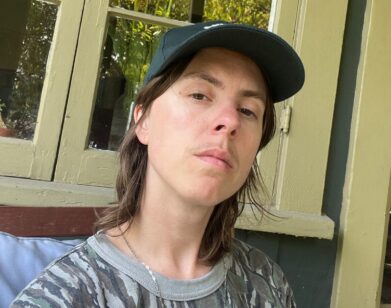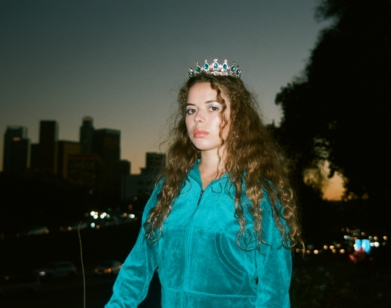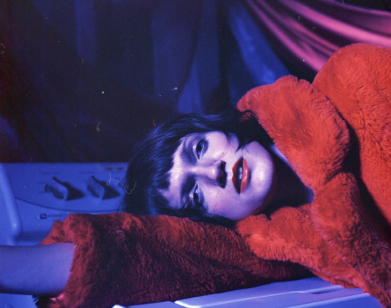Big Thief Is Finding Its Way Home
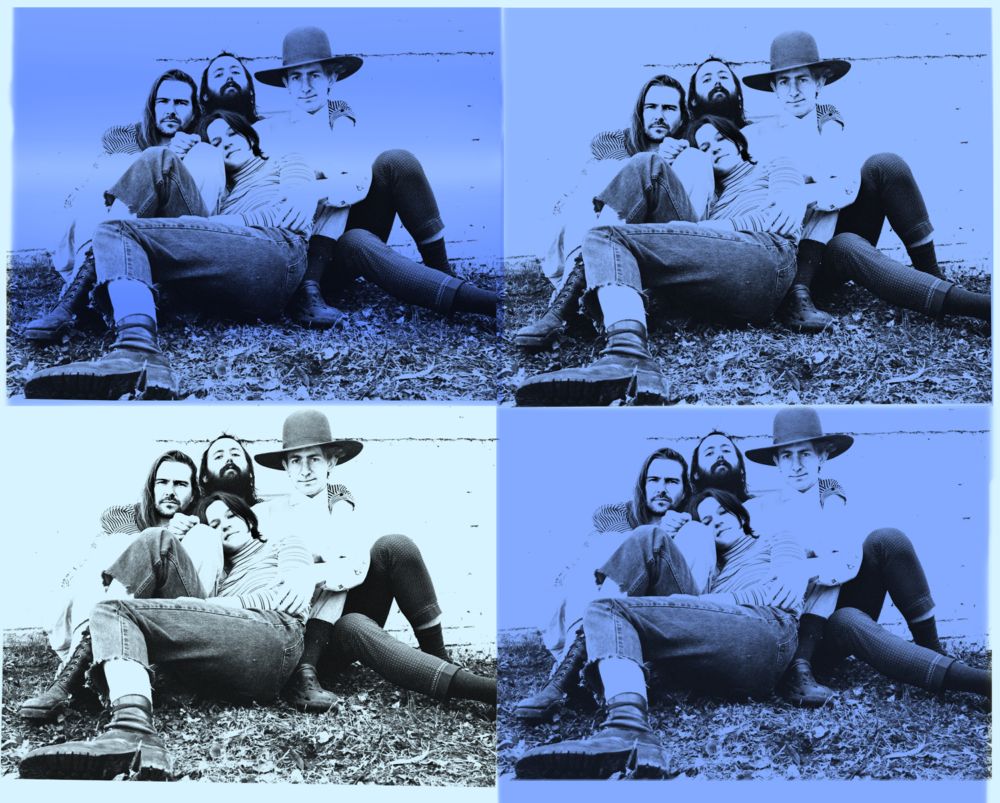
When I first meet Adrianne Lenker at a café in Park Slope, she’s sketching a tree in charcoal, pencil flowing freely along its winding arms. Perhaps she had been working on it for a while, or maybe the setting, a half-mile from the leafy Prospect Park, struck a chord. After all, her band, Big Thief, has roots in Brooklyn, though Lenker’s are scattered throughout the American heartland. Born into a religious cult in Indianapolis and raised in a big blue van that traversed various corners of the Midwest—some Amish, some Russian, some filled with stay-at-home dads who would show her old records and teach her how to finger-pick—Lenker possesses the lifelong impulse to wander. (At age 12, she was already playing in bars.) That sense of searching for a home and never quite finding it is lodged firmly in Big Thief’s music, which practically begs to be played at high volume, rolling down a highway (preferably with the top down). “There’s a traveling element to the music that’s constant throughout all of it,” Lenker tells me, wearing a singular cross earring, an old blazer from a junk shop in Minnesota, and her signature buzzcut. “I think maybe it came from having grown up with parents who are always seeking and searching, not only seeking and searching for a home, but more so on an internal level to find some kind of … I don’t even know what it is. It’s kind of impossible to describe. Searching for a closeness or connection, you know?”
Big Thief’s last album, UFOF, was a bit of a departure from the band’s signature rollicking anthems—folkier, funkier, and more suited to a hash-laced basement than the open road. But their follow-up, Two Hands, which is largely composed of songs that have long been live staples for the band, is familiar in its nostalgia—though this time, the melodies swirl outward, expanding into the stratosphere. The album is a return to their homegrown sound, but another rung on the ladder toward collective consciousness. Whereas UFOF was recorded in a damp log cabin in Washington State, the band conceived of Two Hands in El Paso, along the U.S.-Mexican border, at a time when tightening borders and separating families has become national policy. “The fence actually ran through the property of the recording studio. It was literally just a big tall fucking fence in the dirt,” she says. “There’s so much beauty in this country, but it just seems like some kind of crazy joke sometimes. It’s like some twisted psychedelic experience to observe what’s happening at the border right now. Trying to protect something that isn’t even ours.”
Around this time last year, at a Big Thief show at Brooklyn Steel, Lenker paused between songs to whisper a tale about a time she stopped to lay down in the cool earth, feeling her body sinking into the ground, the dirt enveloping her fingers. It’s that return to its roots that makes the band so evocative—of time and place, of air and worms and birds chirping in the distance. On Two Hands, it finally looks like they’ve arrived, feet planted in the ground, at something like home.
———
ADRIANNE LENKER: Are you cold in here?
SARAH NECHAMKIN: I actually got kind of hot running over here. That’s a cool blazer though. Where did you get it?
LENKER: From a junk shop in Minnesota. It’s old. What happened to your finger?
NECHAMKIN: I cut it on a razor. I went to Urgent Care yesterday to make sure it wasn’t infected, and it still hadn’t stopped bleeding, so they had to cauterize it.
LENKER: Oh wow.
NECHAMKIN: It’s funny because I was listening to your music on the way over here, and I was thinking about how there are references to blood and wounds. I feel like there’s something about physical pain, that in the moment you’re so aware of your body that it grounds you, in some way.
LENKER: Everything else seems secondary. It puts things into perspective a little bit. If you had a kid and they got hurt, your main priority would be to just take care of your kid. You would cancel something in a heartbeat. To remember to care for yourself that way, it’s good. Especially growing up, I feel it’s hard to make that transition where you’re no longer held, where you’re kind of on your own in the world, and to remember to nurse yourself the way a parent or someone who has taken care of you would.
NECHAMKIN: When you get to a certain age, I think a lot of people feel almost ashamed to acknowledge that they still need a level of comfort. Your music openly acknowledges that need for protection. There’s a line—
LENKER: “Everybody needs a home and deserves protection.”
NECHAMKIN: Yeah. Can you speak to that desire in your writing? Do you feel like there’s a child within you that comes out through your work?
LENKER: I’m constantly aware of my mother-father-child dynamic playing itself internally. I can feel my motherhood in myself, and I can feel my child and the relationship between those two. And also, I just feel that Earth is the truest mother that we know. It’s been really hard to heal the wounds of the Earth because we’re depleting and stripping the Earth and mining for minerals and contaminating water. It’s just so strange to me that there are people who don’t consider that we’re actually just doing it to ourselves, because we’re one organism and this is our truest home. It provides everything that we need. We need that home. We need the nourishment. Nature knows how to balance itself out.
Human beings feel like we’re the most sentient, most intelligent, most highest form of consciousness that exists. But I just don’t think that could be possible because there are plants that have been living here for far longer than human beings. If you look at your body on a micro level, and you get a cut, you’re aware: “Oh, this is the only body I’ve got. I better take care of it.” And it’s kind of like that with Earth too. It’s like it’s a body, and everyone can feel it. I think global anxiety levels are up higher now. Tension happens between everyone, like a shared space, a shared consciousness.
NECHAMKIN: It’s all interconnected.
LENKER: Yeah. And we’re so fixated on putting up little divisions. This is our land, that’s your land, these are the borders and the barriers, and this is us and that’s the other. I don’t understand how there are actually human beings who prioritize personal gain and money and accumulation of power over everything at the cost of so many people’s lives.
NECHAMKIN: I feel like those divisions are preventing us from, to use the cut metaphor, feeling it and being able to react to it. Because if it’s not my problem, if it’s some other person or entity’s problem, then I don’t have to take care of it.
LENKER: Totally. And I think there’s a million ways we can distract ourselves from that feeling too.
NECHAMKIN: Do you feel like that that was at the forefront of your mind when you were writing? People like to separate the political and the personal or emotional, and I feel like your work has always skewed—if you were to divide it that way—toward the more internal. Do you feel like it has expanded to be more globally oriented?
LENKER: Yeah, I think my awareness has expanded. You know when you’re a kid and maybe your perception goes as far as, like, your neighborhood, and then you realize the world’s bigger? And you start to learn and see that you’re actually a part of something a lot bigger. I feel like my consciousness has just been growing, and so naturally the work is showing that. But I don’t think there is a separation between personal and political issues, because I think we’re so outwardly focused on the dialogue, debate, and all of this political language and jargon that is inherently polarizing. There are these little wars that happen all the time between people who have different political views and stances, and I just feel like we need more energy put into uniting people, not dividing them. Ultimately, if there’s a room of people that we’re playing to, I don’t really want it to be a matter of who someone voted for or what someone’s religious beliefs are or what’s someone’s identity. I just want everyone to feel welcome in the space of the music and to spread as much of that frequency of love and healing energy as possible.
NECHAMKIN: The fact that that in and of itself is considered political is kind of crazy. “Safe space” has become a charged term, even though it’s really the opposite of that.
LENKER: Everything becomes a slogan, and then people judge it. The thing is, I feel like we’re still so at the beginning of our journey, this band and me as a writer and just on a personal creative level. There are so many things I feel all the time that I want to be able to articulate and write about, but I need to become more educated, and I need to learn more, and I need to expand my mind more. Because ultimately, focusing on the personal stuff—if everyone did that, if everyone focused on their own healing and trying to take down some of their own barriers and their own walls, their own judgments, the whole world would benefit.
NECHAMKIN: Most musicians that I’ve met just want to do their music, but they’re coming up against this need to be a brand or to do the press and feed the beast that is the industry. It’s refreshing when a band can be really authentic and vulnerable and still have such a following. But I know a lot of musicians don’t get that opportunity.
LENKER: Totally. It is a business and an industry, which, when we started out, I really didn’t realize. I knew about the music industry, but I didn’t really. The way the whole band started was that I came to New York City, met Buck [Meek] and we saved up working day jobs, and then just bought an RV and started burning CDs and touring around and booking our own tours and playing anywhere we could play. And at that point it was, like, success. It felt like we already made it.
NECHAMKIN: You just wanted to do your thing.
LENKER: Yeah, we don’t need any anything. And if a label wants to support us, that’s awesome, but we’re never going to compromise what we want to do because we already know we can do it on our own. But I have seen definitely the whole money side of it. There’s this facade, or this pretend world or something, that could just totally erode. There are some artists who have kids and who need to be able to pay for their kids’ surgery, so they do a car ad or a McDonald’s ad. And it’s like, how can you really fully judge that? It’s so hard to just be like, “Yeah, we’re never going to take anything, we’re never going to do that.” Ultimately, it comes down to an everyday process of trying to navigate in the most clean and clear way.
NECHAMKIN: When a musician gets successful, how does that affect the psyche?
LENKER: I definitely think ignoring all that is the best. Take your time. There’s a lot of pressure to keep building traction, building your career. Maybe you’ll put out four albums every year, and maybe you’ll put out one album and then wait eight years. As long as your goal isn’t to be rich or extremely famous, you’ll be fulfilled. I think when people get stuck on the fame or money aspect of things, which is very human, it can be disappointing or stressful because you’re always chasing that. I don’t need much to make my art. All I need is a cup of coffee, and a roof over my head. I can crash on people’s couches if things get hard. And that’s also a position of privilege, I feel, to be able to make art and know that the worst that could happen is I’m crashing on couches or going to my grandma’s. Many people don’t even have that.
NECHAMKIN: But you’ve kind of always been crashing around, so you’re used to that.
LENKER: Yeah. I guess we were always pretty nomadic since I was a kid. Nomads who stayed in one tiny little area, but moved around a lot in that one area.
NECHAMKIN: Do you think that expressed itself in the lyrics about finding a home and cradling that inner child who might still be longing for that anchor?
LENKER: There’s a traveling element to the music that’s constant throughout all of it. I think maybe it came from having grown up with parents who are always seeking and searching, not only seeking and searching for a home, but more so on an internal level to find some kind of … I don’t even know what it is. It’s kind of impossible to describe. Searching for a closeness or connection, you know?
That’s sometimes why I feel crazy. Because I feel like I’m searching for something in music or in art, just searching for something that is completely invisible, intangible, immeasurable. But I know when I feel closer to it, it’s like this kind of magic that lets you know that magic is real, that there are things and courses that are much more vast than our small finite human experience, and that there is true connectivity among humans. Feeling the energy in a room. What does that even mean, “energy in a room”? How can we feel each other like that? And yet it feels good to get closer to that.
NECHAMKIN: If you’re someone who’s always been searching, music is a way to channel it, rather than sitting in the emptiness of it or seeking to fill it, but knowing that it will never be filled. Someone who’s looking for money or fame for the sole purpose of that is expecting it to be filled permanently, whereas you’re aware that there will still be a level of hollowness.
LENKER: I think emptiness is huge. I think about it a lot. When I’m on tour or something, I can feel when I’m trying to escape it, sitting in the void when I’m finally alone for a few days in stillness. I really want to start to feel more comfortable with the emptiness. Have you ever walked into a forest at night? Even if it’s just outside of a house, but you just go by yourself for a moment and you’re just on the edge of a lawn or something and there’s just woods, and if you just go in a little bit, there’s people in the house, it’s warm, you can see the lamp light, and you’re just by yourself suddenly. You could just walk in there and be with the trees in the stillness of night by yourself. And there’s something to me that feels scary about that still. I don’t know what it is.
NECHAMKIN: It’s also kind of exhilarating. I think that’s the best space to be in, when you know the light’s on behind you, but you’re looking toward the dark. You’re pushing your comfort zone, but you know you’ll be okay.
LENKER: I do often think about going and hiking a very long trail by myself, where there isn’t that sort of comfort.
NECHAMIN: You recorded the new album out in the desert, right?
LENKER: Yeah, just outside of El Paso on the Mexican border. We wanted to do something that would very deeply contrast UFOF. Because we recorded that album in Washington State in the temperate rainforest, and we were focused on bringing the ethereal element to life, layering it and making these sort of soundscapes, using a lot more textures.
NECHAMKIN: It reminded me of something that you would listen to in a ‘70s sunken living room on, like, a flokati rug.
LENKER: It kind of was. It was in this 70s decked out barnhouse thing. There was shag carpeting in some of the rooms, and it felt like a cabin in the Pacific Northwest. It was really fun and lush, and so we made the arrangements more lush. It has a softness to it, I think.
Five days after we finished that record, we went down and started Two Hands, and it was dry and hot and desolate right there on the border, which ended up being very poignant. I hadn’t really thought about it much beforehand, but it made sense that we would record those specific songs right there on a border. The concept of a border is very strange, and the fence actually ran through the property of the recording studio. So I would go jogging in the morning, and I would run to the fence and just look out at Mexico. It was literally just a big tall fucking fence in the dirt. And then it’s the same on the other side. It’s just like, this is ours, that’s yours. And it’s not even ours because we took this land from indigenous people. It’s so bizarre to me that we’re saying America, the land of the free, home of the brave, and all these slogans. I love this land. There’s so much beauty in this country, but it just seems almost like some kind of crazy joke sometimes. It’s like some twisted psychedelic experience to observe what’s happening at the border right now.
NECHAMKIN: And there’s that metaphor of borders more generally, the divides between people and within yourself—like the mother-child dynamic you mentioned.
LENKER: Yeah. On one level, it’s very complicated. But on another level, it seems so simple. I think the thing that we should avoid at all costs is not loss of money or property or resources. I think we should avoid violence at all costs, avoid killing other humans at all costs, avoid separating families, separating children from their parents. Doesn’t matter where you’re from. You’re a human being.
One of the songs on the album is “Forgotten Eyes,” and in there, “Forgotten Tongue is the language of love” is a repeated line at the end. No matter what you believe or what your political stances are, the language of love—there’s a lot of language that we can communicate with each other that goes way deeper than any of this stuff. If you’re looking at a kid and they’re hurt, you’re going to take care of the kid. You’re not going to be like, “First let me check, where are you from?” You’re going to be like, “Let me help you sweetheart.”
I talk to a lot of younger kids, and a lot of them are feeling really disheartened. And I’m just like, we can’t let that vision die of what it would feel like to actually heal the Earth. Because that’s when it really does die.

